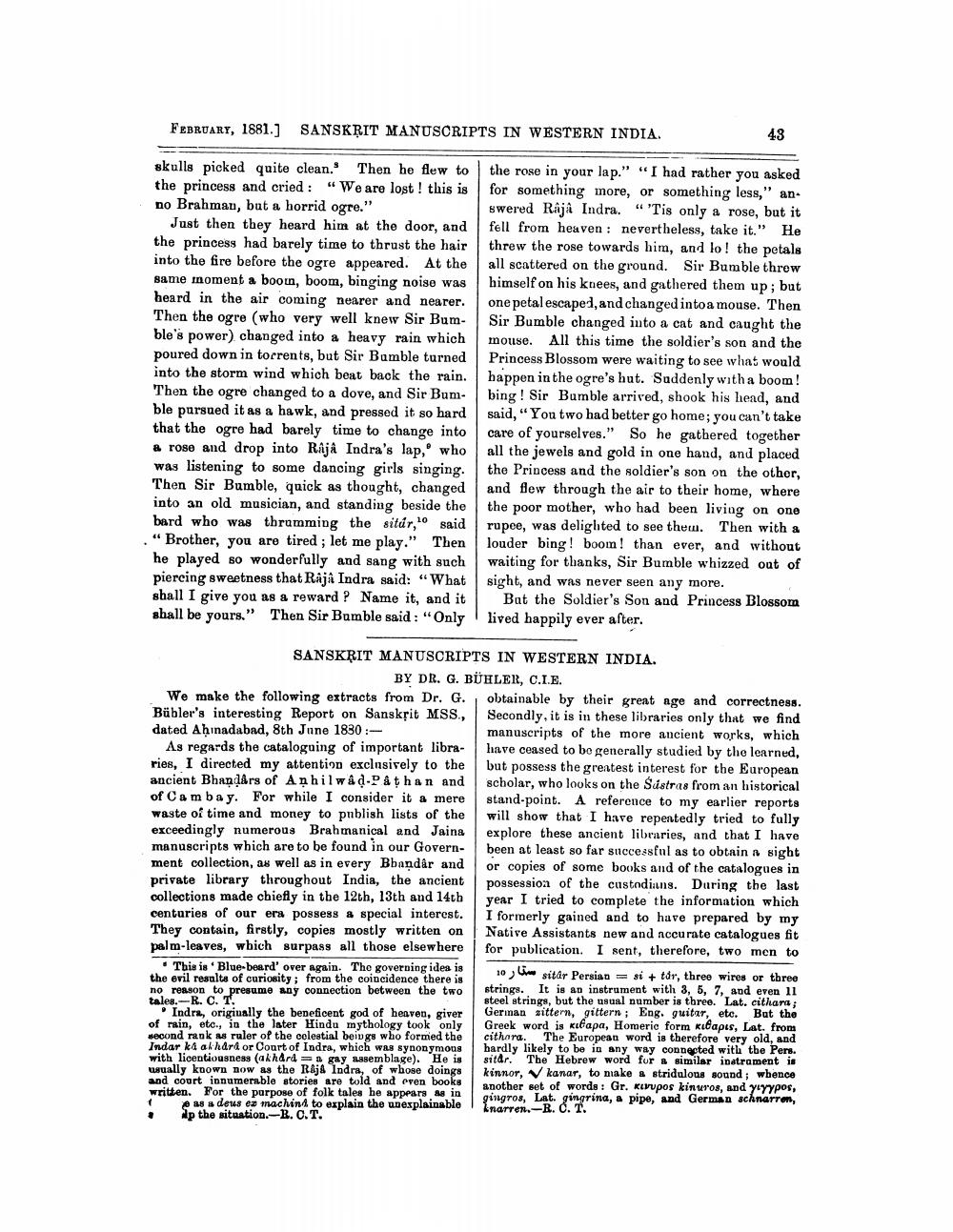________________
FEBRUARY, 1881.
SANSKRIT MANUSCRIPTS IN WESTERN INDIA.
43
skulls picked quite clean." Then he flew to the princess and cried: “We are lost ! this is no Brahman, but a horrid ogre."
Just then they heard him at the door, and the princess had barely time to thrust the hair into the fire before the ogre appeared. At the same moment a boom, boom, binging noise was heard in the air coming nearer and nearer. Then the ogre (who very well knew Sir Bumble's power) changed into a heavy rain which poured down in torrents, but Sir Bamble turned into the storm wind which beat back the rain. Then the ogre changed to a dove, and Sir Bumble pursued it as a hawk, and pressed it so hard that the ogre had barely time to change into & rose and drop into Raja Indra's lap," who was listening to some dancing girls singing Then Sir Bumble, quick as thought, changed into an old musician, and standing beside the bard who was thrumming the sitúr," said "Brother, you are tired ; let me play." Then he played so wonderfully and sang with such piercing sweetness that Raja Indra said: "What shall I give you as a reward P Name it, and it shall be yours." Then Sir Bumble said: "Only
the rose in your lap." "I had rather you asked for something more, or something less," answered Raja Indra. "'Tis only a rose, but it fell from heaven: nevertheless, take it." He threw the rose towards him, and lo! the petals all scattered on the ground. Sir Bumble throw himself on his knees, and gathered them up; but one petal escaped, and changed into a mouse. Then Sir Bumble changed into a cat and caught the mouse. All this time the soldier's son and the Princess Blossom were waiting to see what would happen in the ogre's hut. Suddenly with a boom! bing ! Sir Bumble arrived, shook his head, and said, "You two had better go home; you can't take care of yourselves." So he gathered together all the jewels and gold in one hand, and placed the Princess and the soldier's son on the other, and flew through the air to their home, where the poor mother, who had been living on one rupee, was delighted to see them. Then with a louder bing! boom! than ever, and without waiting for thanks, Sir Bumble whizzed out of sight, and was never seen any more.
Bat the Soldier's Son and Princess Blossom lived happily ever after.
SANSKRIT MANUSCRIPTS IN WESTERN INDIA.
BY DR. G. BÜHLER, C.L.E. We make the following extracts from Dr. G., obtainable by their great age and correctness. Bübler's interesting Report on Sansksit MSS., Secondly, it is in these libraries only that we find dated Ahinadabad, 8th June 1830 :
manuscripts of the more ancient works, which As regards the cataloguing of important libra- have ceased to be generally studied by the learned, ries, I directed my attention exclusively to the but possess the greatest interest for the European ancient BhandArs of Anhilwad.P& than and scholar, who looks on the Sústras from an historical of Cam bay. For while I consider it a mere stand-point. A reference to my earlier reports waste of time and money to publish lists of the will show that I have repeatedly tried to fully exceedingly numerous Brahmanical and Jaina explore these ancient libraries, and that I have manuscripts which are to be found in our Govern- been at least so far successful as to obtain a sight ment collection, as well as in every Bbandar and or copies of some books and of the catalogues in private library throughout India, the ancient possession of the custodians. During the last collections made chiefly in the 12th, 13th and 14th year I tried to complete the information which centuries of our era possess a special interest. I formerly gained and to have prepared by my They contain, firstly, copies mostly written on Native Assistants new and accurate catalogues fit palm-leaves, which surpass all those elsewhere for publication. I sent, therefore, two men to This is Blue-beard' over again. The governing idea is
10 i the evil results of curiosity; from the coincidence there is
sitar Persian si + tår, three wires or three no reason to presume any connection between the two strings. It is an instrument with 3, 5, 7, and even 11 tales.-R. C. T.
steel strings, but the usual number is three. Lat. cithans; Indra, originally the beneficent god of heaven, giver German sitter, gittern; Eng. guitar, etc. But the of rain, etc., in the later Hindu mythology took only Greek word is κιθαρα, Homerie form κιθαρις, Lat. fποι second raak m ruler of the celestial beings who formed the cithora. The European word is therefore very old, and Indar ka akhart or Court of Indra, which was synonymous hardly likely to be in any way connected with tbe Pers. with licentiousness (akhari = gay, assemblage). He is sitar. The Hebrew word fur & similar inatrament in mually known now as the Raja Indra, of whose doings kinnor, v kanar, to make a stridulous sound; whence and court innumerable stories are told and even books
another set of words: Gr. Kivupos kinuros, and yuyypos, written. For the purpose of folk tales he appears as in
gingros, Lat. gingrina, & pipe, and German schnarren, as a deus ea machind to explain the unexplainable Inarren-R.O.T. Rp the situation.-R.C.T.




